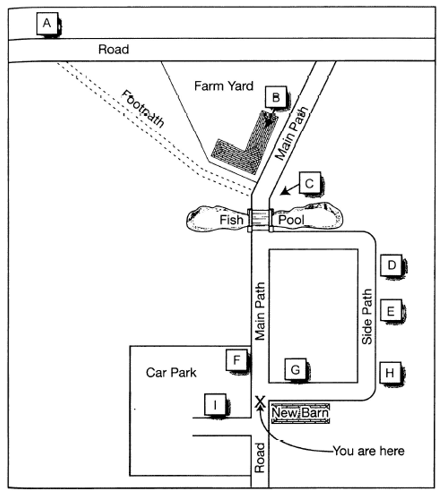Part 1: Questions 1-10
Complete the notes below. Write ONE WORD AND/OR A NUMBER.
HIRING A PUBLIC ROOM
• The main hall seats 200
Room and cost
• The (1) room seats 100
• Cost of main hall for Saturday evening: (2) £ + £250 deposit (3) payment is required)
• Cost includes use of tables and chairs and also (4)
• Additional charge for use of the kitchen: £25
Before the event
• Will need a (5) licence
• Need to contact caretaker (Mr Evans) in advance to arrange (6)
During the event
• The building is no smoking
• The band should use the (7) door at the back
• Don’t touch the system that controls the volume
• For microphones, contact the caretaker
After the event
• Need to know the (8) for the cleaning cupboard
• The (9) must be washed and rubbish placed in black bags
• All (10) must be taken down
• Chairs and tables must be piled up
Part 2: Questions 11-14
Complete the notes below. Write ONE WORD for each answer.
Fiddy Working Heritage Farm
Advice about visiting the farm
Visitors should
• Take care not to harm any (11)
• Not touch any (12)
• Wear (13)
• Not bring (14) into the farm, with certain exceptions
Questions 15-20
Label the map below. Write the correct letter A-I, next to questions 15-20.
15. Scarecrow
16. Maze
17. Café
18. Black Barn
19. Covered picnic area
20. Fiddy house
Part 3: Questions 21-30
Choose the correct letter A, B or C.
Study on Gender in Physics
21. The students in Akira Miyake’s study were all majoring in
A physics
B psychology or physics
C science, technology, engineering or mathematics
22. The aim of Miyake’s study was to investigate
A what kind of women choose to study physics
B a way of improving women’s performance in physics
C whether fewer women than men study physics at college
23. The female physics students were wrong to believe that
A the teachers marked them in an unfair way
B the male students expected them to do badly
C their test results were lower than the male students’
24. Miyake’s team asked the students to write about
A what they enjoyed about studying physics
B the successful experiences of other people
C something that was important to them personally
25. What was the aim of the writing exercise done by the subjects?
A to reduce stress
B to strengthen verbal ability
C to encourage logical thinking
26. What surprised the researchers about the study?
A how few students managed to get A grades
B the positive impact it had on physics results for women
C the difference between male and female performance
27. Greg and Lisa think Miyake’s results could have been affected by
A the length of the writing task
B the number of students who took part
C the information the students were given
28. Greg and Lisa decide that in their own project, they will compare the effects of
A two different writing tasks
B a writing task with an oral task
C two different oral tasks
29. The main finding of Smolinsky’s research was that class teamwork activities
A were most effective when done by all-women groups
B had no effect on the performance of men or women
C improved the results of men more than of women
30. What will Lisa and Greg do next?
A talk to a professor
B observe a science class
C look at the science timetable
Part 4: Questions 31-40
Complete the notes below. Write ONE WORD ONLY.
Ocean Biodiversity
Biodiversity hotspots
• areas containing many different species
• important for locating targets for (31)
• at first only identified on land
Boris Worm, 2005
• identified hotspots for large ocean predators, e.g. sharks
• found that ocean hotspots:
– were not always rich in (32)
– had higher temperatures at the (33)
– had sufficient (34) in the water
Lisa Ballance, 2007
• looked for hotspots for marine (35)
• found these were all located where ocean currents meet
Census of Marine Life
• found new ocean species living:
– under the (36)
– near volcanoes on the ocean floor
Global Marine Species Assessment
• want to list endangered ocean species, considering:
– population size
– geographical distribution
– rate of (37)
• Aim: to assess 20,000 species and make a distribution (38) for each one
Recommendations to retain ocean biodiversity
• increase the number of ocean reserves
• establish (39) corridors (e.g. for turtles)
• reduce fishing quotas
• catch fish only for the purpose of (40)